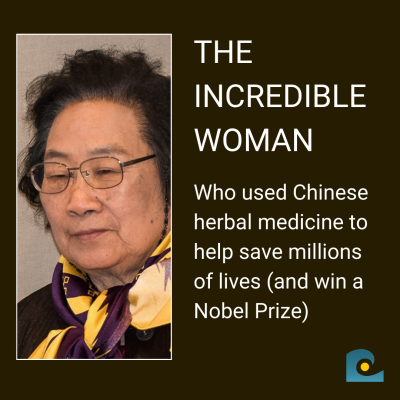
In 1967, the Chinese government launched secret military Project 523 to find a treatment for chloroquine resistant malaria. This was in response to a request from their North Vietnamese allies in the Vietnam war, who were badly affected by malaria. The disease was also killing many people in southern China at the time.
Tu Youyou had studied pharmaceutical science at Beijing Medical College, and also spent three years full-time training in traditional Chinese medicine (TCM). In 1969 she was appointed head of Project 523. She had to leave her two young children behind, not seeing them again for three years, later saying that “The work was the top priority, so I was certainly willing to sacrifice my personal life”. At the time when Tu Youyou was chosen for this government project, her engineer husband was detained in a labour camp as part of the Chairman Mao Zedong’s Cultural Revolution, during which many scientists and intellectuals were persecuted.
At this point, it is believed that over 240,000 compounds had been unsuccessfully tested for their effectiveness against malaria, leaving scientists around the world at a loss. Tu Youyou decided that it would be worthwhile to screen herbs used in traditional Chinese medicine, and they began searching for herbs that may have an antimalarial effect. Here they found reference to a herb used for ‘intermittent fevers’ (a symptom of malaria) in a book that was over 1200 years old. The herb is called Artemisia annua, also known as sweet wormwood or Qing Hao.
Initial experiments with artemisia annua extracts were disappointing, and it seemed as though the herb was less effective than hoped. Upon reviewing the original ancient texts, Tu Youyou realised that the traditional preparation of the herb avoided putting it in boiling water as they had been doing, instead soaking it in cold water. When she went back and tried again with a lower-temperature extraction method, key compounds within the herb remained intact. Further testing with this new extraction method had a 100 percent success rate. Tou and two colleagues tested the treatment on themselves, before administering it to the first 21 malaria patients in China selected for human trials. All of them recovered.
In 1979 the group finally published their work in English in the Chinese Medical Journal. In 1981, the WHO, World Bank, and UN all invited Tu Youyou to present the findings of her work. After incredible effort by this team of Chinese scientists, the WHO eventually recommended artemisinin for treating malaria, and to this day artemisinin-based combination therapy medicines are still cited as the most effective treatment for P. falciparum malaria, which is considered to be the deadliest form of the disease and is the most prevalent form in Africa. The WHO estimate that 1.5 billion malaria cases have been averted 7.6 million lives have been saved since the year 2000, and artemisia treatment has been a crucial component in this.
Tu Youyou won the Lasker Award in 2011, and the 2015 Nobel Prize in Physiology or Medicine. Her Nobel lecture was titled ‘Discovery of Artemisinin: A Gift from Traditional Chinese Medicine to the World.’ Tu Youyou has been clear in attributing the discovery of artemisinin to the efforts of her entire team, rather than just being an individual effort, and stated that the award was also “for Chinese science and for traditional Chinese medicine”. She was the first Chinese Nobel laureate in physiology or medicine, and first ever Chinese woman to win a Nobel Prize.
References:
1.The Nobel Prize. The Nobel Prize | Women who changed science | Tu
Youyou [Internet]. Nobelprize.org. 2019. Available from: https://www.nobelprize.org/womenwhochangedscience/stories/tu-youyou
2.Dambeck S. The Modest Nobel Laureate: Youyou Tu [Internet]. The Lindau
Nobel Laureate Meetings. Available from: https://www.lindau-nobel.org/the-modest-nobel-laureate-youyou-tu/
3.World Health Organisation. World Malaria Report 2020 [Internet].
www.who.int. 2020. Available from: https://www.who.int/teams/global-malaria-programme/reports/world-malaria-report-2020
4.World Health Organisation. Fact sheet about malaria [Internet].
www.who.int. 2023. Available from: https://www.who.int/news-room/fact-sheets/detail/malaria#:~:text=P.%20falciparum%20is%20the%20deadliest
5.Cochran M. Heroes of Progress, Pt. 25: Tu Youyou [Internet]. Human
Progress. 2019 [cited 2024 Aug 20]. Available from: https://humanprogress.org/heroes-of-progress-pt-25-tu-youyou/
6.Wright CW, Linley PA, Brun R, Wittlin S, Hsu E. Ancient Chinese
Methods Are Remarkably Effective for the Preparation of Artemisinin-Rich
Extracts of Qing Hao with Potent Antimalarial Activity. Molecules [Internet].
2010 Feb 4 [cited 2022 Dec 21];15(2):804–12. Available from: https://www.ncbi.nlm.nih.gov/pmc/articles/PMC6257115/
7.BBC Two – Icons: The Greatest Person of the 20th Century – Tu Youyou
[Internet]. BBC. Available from: https://www.bbc.co.uk/programmes/profiles/xTstrz9f4JdwzfcW9WGYqj/tu-youyou
